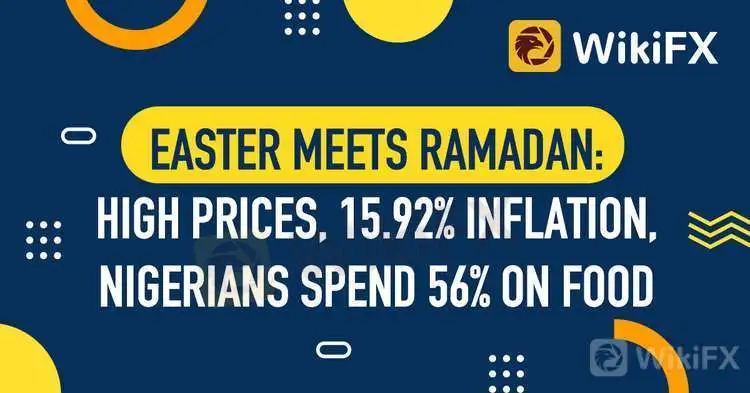简体中文
繁體中文
English
Pусский
日本語
ภาษาไทย
Tiếng Việt
Bahasa Indonesia
Español
हिन्दी
Filippiiniläinen
Français
Deutsch
Português
Türkçe
한국어
العربية
EASTER MEETS RAMADAN: HIGH PRICES, 15.92% INFLATION, NIGERIANS SPEND 56% ON FOOD
Abstract:The global rise in food prices is weighing on emerging and developing economies, and Nigerians are now spending more than 56% of their total income on food, as food inflation in the country approaches 18% after printing 17.20% year on year in March 2022, according to current National Bureau of Statistics (NBS) figures.

The global rise in food prices is weighing on emerging and developing economies, and Nigerians are now spending more than 56% of their total income on food, as food inflation in the country approaches 18% after printing 17.20% year on year in March 2022, according to current National Bureau of Statistics (NBS) figures.
Between 2020 and 2022, average commodity prices in Nigeria increased by about 127%, reflecting the reality on the ground, with consumers remaining strained, pinched, and beleaguered at a time when official inflation is at 15.92%, climbing for the third consecutive month in 2022. Nigerians' purchasing power continues to be undermined by the naira's ongoing depreciation, a pressure that is unrelenting, with the indigenous currency presently selling at around N600 to the dollar on the parallel market.
The ongoing conflict between Ukraine and Russia, which is now registering in the nation, is putting pressure on local commodities prices.
It is an election year, and analysts have predicted that election spending will fuel inflationary pressures and squeeze the pockets of ordinary Nigerians. While inflation figures may gradually rise or fall, consumer goods prices will continue to see demand and cost pull inflation in the face of current realities in Nigeria.
According to analysts at Financial Derivatives Company Limited, “it is disheartening that five of Nigeria's seven biggest import partners are battling with growing inflation while critical import commodity prices have risen dramatically.” Food contributes to 20% of consumer spending in developing markets, up to 40% in Sub-Saharan Africa, and 56% in Nigeria. Food price increases have aggravated existing macroeconomic challenges in several emerging nations, which are dealing with high debt levels, currency constraints, and inflation.
According to Afrinvest Research and Consulting, “food inflation jumped 25 basis points to 1.9% month on month in February due to continued insecurity concerns in rural areas and the impact of [the] Russian-Ukraine situation on wheat and corn prices.” Similarly, core inflation increased by 8 basis points to 1.3% month on month as PMS shortages pushed up costs. We expect these variables to continue impacting price trajectory in March, and as a result, we forecast that headline inflation will climb to 15.73% year on year. It outperformed this posting by 15.92%.
Following the blues of December 2021, which brought the annual inflation average to 17% with the headline inflation index changing direction to 15.4% year on year following the decelerations recorded in the previous 8 months, 2022 began with an upward trend in the numbers and, for the third consecutive month, the headline inflation in Nigeria printed at 15.92% year on year in March 2022 due to price increase expectations in the month ahead of Ramadan.
According to the NBS inflation data, food inflation in March was highest in Kogi at 22.21%, followed by Cross River at 19.86% and Kwara at 19.53%, while Sokoto had the slowest rise in year-on-year food inflation at 14.04%, followed by Kaduna and Rivers at 14.66% and 14.81%, respectively.
Pressures from the upcoming elections are already expected to result in higher inflation numbers, and with the economy grappling with unemployment, low revenue, insecurity, a weak naira, slow output growth challenges, global inflation, supply disruptions, and climate shocks, the average Nigerian will still be in pole position to experience the looming effect, which is likely to place Nigerians in their millions back into poverty if fiscal and monetary policymakers do nothing.

Disclaimer:
The views in this article only represent the author's personal views, and do not constitute investment advice on this platform. This platform does not guarantee the accuracy, completeness and timeliness of the information in the article, and will not be liable for any loss caused by the use of or reliance on the information in the article.
Related broker
Read more

Trader Exposes Unethical Practices by STP Trading
A recent allegation against STP Trading has cast doubt on the firm's business practices, highlighting the potential risks faced by retail traders in an increasingly crowded and competitive market.

FCA Identifies Clone Firm Exploiting Admiral Markets' Credibility
The UK Financial Conduct Authority (FCA) has issued a public warning regarding a fraudulent entity impersonating Admiral Markets, a legitimate and authorised trading firm. The clone firm, operating under the name Admiral EU Brokers and the domain Admiraleubrokerz.com, has been falsely presenting itself as an FCA-authorised business.

Malaysian Man Loses RM113,000 in Foreign Currency Investment Scam
A 57-year-old Malaysian man recently fell victim to a fraudulent foreign currency investment scheme, losing RM113,000 in the process. The case was reported to the Commercial Crime Investigation Division in Batu Pahat, which is now investigating the incident.

Broker Review: What is FXTM exactly? Is FXTM a Scam?
FXTM is a global forex broker founded in 2011. In today’s article, we are going to show you what FXTM looks like in 2024.
WikiFX Broker
Latest News
Webull Partners with Coinbase to Offer Crypto Futures
eToro Expands Nationwide Access with New York Launch
Why Is UK Inflation Rising Again Despite Recent Lows?
Hackers Charged for $11M Crypto Theft Using SIM-Swaps
Role of Central Banks in the FX Market
FCA Alerts Against Sydney FX
What Makes Cross-Border Payments Easier Than Ever?
Trader Exposes Unethical Practices by STP Trading
Interactive Brokers Launches Tax-Friendly PEA Accounts in France
Google Warns of New Deepfake Scams and Crypto Fraud
Currency Calculator


